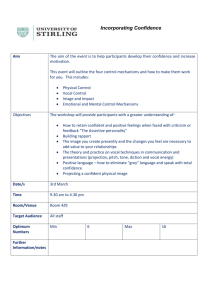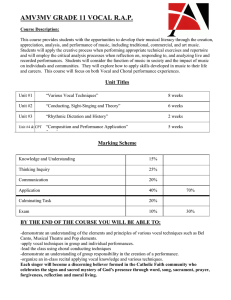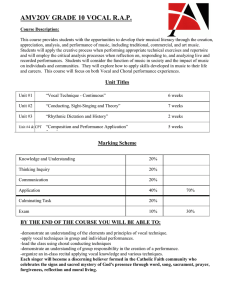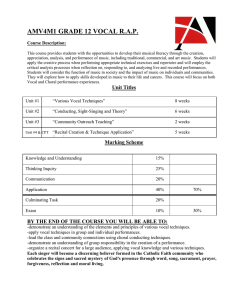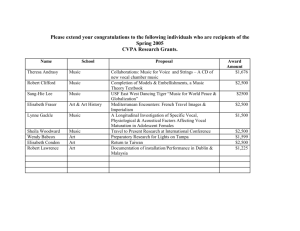MUSED 678 Informed Reg.doc
advertisement
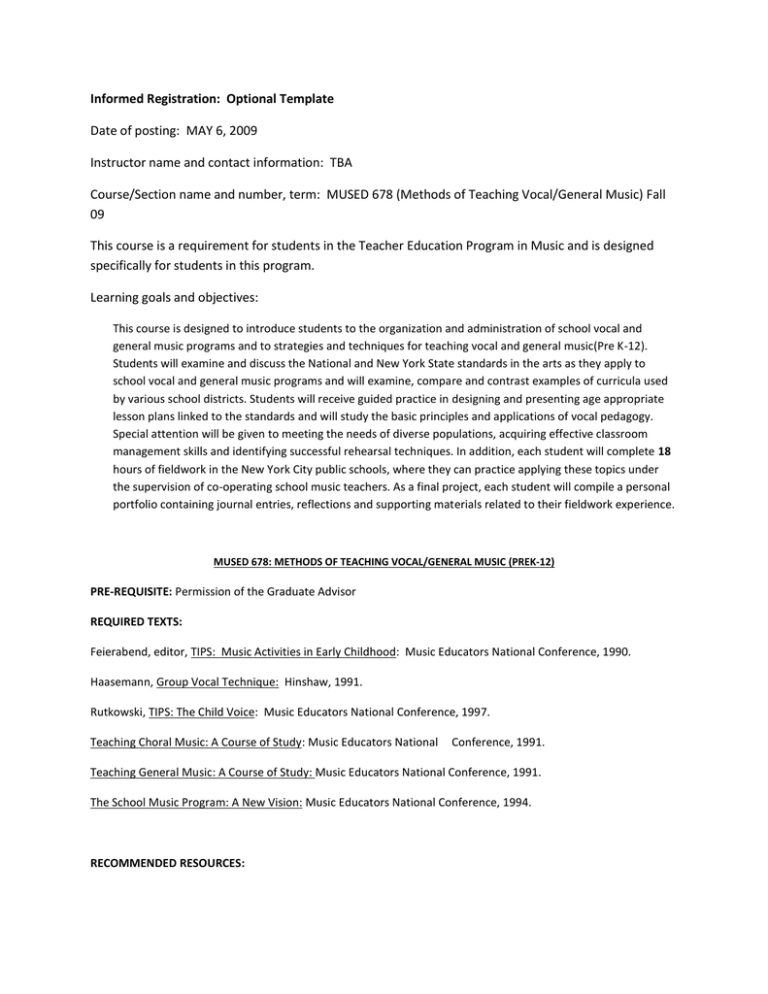
Informed Registration: Optional Template Date of posting: MAY 6, 2009 Instructor name and contact information: TBA Course/Section name and number, term: MUSED 678 (Methods of Teaching Vocal/General Music) Fall 09 This course is a requirement for students in the Teacher Education Program in Music and is designed specifically for students in this program. Learning goals and objectives: This course is designed to introduce students to the organization and administration of school vocal and general music programs and to strategies and techniques for teaching vocal and general music(Pre K-12). Students will examine and discuss the National and New York State standards in the arts as they apply to school vocal and general music programs and will examine, compare and contrast examples of curricula used by various school districts. Students will receive guided practice in designing and presenting age appropriate lesson plans linked to the standards and will study the basic principles and applications of vocal pedagogy. Special attention will be given to meeting the needs of diverse populations, acquiring effective classroom management skills and identifying successful rehearsal techniques. In addition, each student will complete 18 hours of fieldwork in the New York City public schools, where they can practice applying these topics under the supervision of co-operating school music teachers. As a final project, each student will compile a personal portfolio containing journal entries, reflections and supporting materials related to their fieldwork experience. MUSED 678: METHODS OF TEACHING VOCAL/GENERAL MUSIC (PREK-12) PRE-REQUISITE: Permission of the Graduate Advisor REQUIRED TEXTS: Feierabend, editor, TIPS: Music Activities in Early Childhood: Music Educators National Conference, 1990. Haasemann, Group Vocal Technique: Hinshaw, 1991. Rutkowski, TIPS: The Child Voice: Music Educators National Conference, 1997. Teaching Choral Music: A Course of Study: Music Educators National Conference, 1991. Teaching General Music: A Course of Study: Music Educators National Conference, 1991. The School Music Program: A New Vision: Music Educators National Conference, 1994. RECOMMENDED RESOURCES: NYSSMA Manual (A resource of graded solo and ensemble music suitable for contests and evaluation festivals): New York State School Music Association. Your MENC membership automatically makes you a NYSSMA member and you can order this manual directly from NYSSMA. Make sure to request the most recent edition with both binder and inserts. Rao, Doreen, ed. Choral Music for Children: An Annotated List: Music Educators National Conference, 1990. (This book is available at the Hunter College Bookstore or you can order it directly from MENC). COURSE PLAN Week 1 Introduction to Methods of Teaching Vocal and General Music: Guidelines and placement for fieldwork: Discussion of portfolio project: MENC membership: Designing a lesson plan. Week 2 Students will discuss and examine the National and New York State music standards as they relate to school vocal and general music instruction. Due Today: Read The School Music Program: a New Vision, pp. 1-26. Week 3 Music in Early Childhood; The Child Voice; General Music Activities for the Primary Grades. Due Today: Read TIPS: Music Activities in Early Childhood and TIPS: The Child Voice. Create rubric for Project #1 w/ student input. Week 4 Singing in the Elementary Grades: Achieving Good Unison Sound; Beginning to Sing in Harmony. Distribute rubrics for Project #1 Week 5 Listening Activities; Due Today: Students will present Project #1. Week 6 Movement Activities; Guest Speaker: Anne Farber: An Introduction to Dalcroze. Due Today: Read the article on Dalcroze previously distributed by the instructor. Students will help develop evaluation criteria for Project #2. Week 7 Composition Activities; Instructor distributes rubrics for Project #2. Week 8 Classroom Instruments; Guest Speaker: Laura Khoulish: An Introduction to the Orff Approach. Week 9 Middle and High School General Music Activities; Sample Lesson Plans; General Music Curricula Pre K-12; Distribute Bobetsky article, “Arranging Musicals for the Middle School Choir” and Chapter 4 from Linda Swears’ Teaching the Elementary Chorus. Week 10 Due Today: Students will present project #2. Organizing the Elementary and Middle School Choral Programs: scheduling, rehearsal techniques, voice production, repertoire; working with changing voices in the middle school choral program Due Today: Read: Group Vocal Technique, pp. 1-35; Read Bobetsky article, “Arranging Musicals for the Middle School Choir”, previously distributed on 3/26; Read Swears Chapter Four (handout), previously distributed on 3/26; Week 11 Relaxation, Posture, and Breath Control; Due Today: Read: Group Vocal Technique, pp. 37-64. Week 12 Resonance, Dynamics, Crescendo, Register, and Range; Due Today: Read: Group Vocal Technique, pp.64-96. PORTFOLIOS ARE DUE TODAY! Week 13 Legato, Staccato, Diction; Due Today: Read: Group Vocal Technique, pp.64-96. Distribute Take Home Final Exam today. Week 14 Score Preparation; Auditioning Singers; Due Today: Read: Group Vocal Technique, pp.137-172. TAKE HOME FINAL EXAM IS DUE TODAY! Week 15 The Choral Curriculum PreK-12; Repertoire for the High School Chorus; Selecting Literature, Conducting Tips; Due Today: Read: Teaching Choral Music: A Course of Study. PROJECTS AND EXAMINATIONS: Two mini-projects, one portfolio and one Take Home Final Exam. Further details about the portfolio can be found on page five of this syllabus. GRADING POLICY: % of Final Grade Due Date Mini-Project #1 15% TBA Mini-Project #2 15% TBA Attendance/Participation 10% ongoing Portfolio 40% 4/30 Take Home Exam 20% 5/14 All assignments, projects and the take home final exam are due on the assigned due dates. Assignment and project grades will be reduced by ten points for each class meeting that an assignment or project remains outstanding. ATTENDANCE AND CLASS PARTICIPATION: It is expected, barring a documented emergency, that all students will attend every class and fieldwork session and will arrive on time. Regular, punctual attendance and participation in class will not only help you to do well in the course, but may also improve your grade; poor attendance and/or lateness will result in a lower grade. You must complete all eighteen (18) hours of fieldwork, verified in writing by the public school co-operating music teacher, on or before the required due date, in order to receive a passing grade in this class. FOOD POLICY: Music Department policy prohibits food and drink in all classrooms. INCOMPLETES: Music Department policy states that the grade of “INCOMPLETE” will be granted only in cases of serious, documented emergencies and then only when permission has been obtained in writing from the Department Chair, no later than one week before the final class meeting. ACADEMIC INTEGRITY: Hunter College regards acts of academic dishonesty (e.g. plagiarism, cheating on examinations, obtaining unfair advantage, and falsification of records and official documents) as serious offenses against the values of intellectual honesty. The College is committed to enforcing the CUNY Policy on Academic Integrity and will pursue cases of academic dishonesty according to the Hunter College Integrity Procedures. WITHDRAWL: Students who wish to withdraw from a class with a grade of W may do so by submitting a withdrawl form with the required signatures to Oasis by the announced deadline (around the 8th week of class). Withdrawl after the deadline is allowed only in cases of serious emergency and must be approved by Student Services. Students who stop attending a class without officially withdrawing will receive grades of WU, which count the same as F. The Music Department does not support requests to have grades of WU changed retroactively to W. DIRECTIONS FOR PREPARING THE FINAL PORTFOLIO PROJECT The final portfolio project will constitute 40% of the final course grade. The entire portfolio must be neatly typed and professionally presented in order to receive full credit. This project is meant to be directly related to your fieldwork experience in the New York City schools. Your portfolio will contain three distinct parts: Journal Entries, Reflections and Supporting Materials. Journal Entries should be presented in the form of a diary. These are your recollections (the facts and events) of what you observed during each day of your fieldwork. Reflections go beyond the facts and represent your attempt to draw conclusions and evaluate what you observed. In what ways was the teacher successful or unsuccessful in his or her teaching methods and rapport with the students? What challenges did the students present to the teacher (in terms of musical skills/abilities and behavior)? Do you agree or disagree with the teacher’s approach in general and in particular situations? What in your opinion are the teacher’s strengths? In what ways do you think the teacher could improve? Did you notice any situations where you would have handled things differently? Why or why not? Describe any interaction you had with the students as part of this field experience. If you were given activities to work on with the students, talk about the nature of the activity and evaluate your experience. What did you learn from this? Supporting Materials should be presented in the style of a scrapbook/album. Include copies of any worksheets, handouts, rules, music, concert regulations etc which may have been passed out to the students during the course of your fieldwork. During the semester, you should arrange to have an individual conference with me to discuss your progress on the portfolio project. At that time, you can show me what you’ve completed to date and I can critique your work and offer suggestions.
